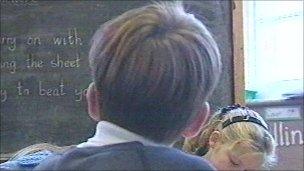Literacy targets missed by one in five pupils
- Published

Literacy levels are slightly up on last year
Almost one in five seven-year-olds in England did not reach government targets for literacy this year, although results improved overall.
Boys did better in reading and writing than last year - but still scored lower than girls - with one in four not reaching the level expected.
Children on free school meals and those with special educational needs continue to perform least well.
Schools Minister Nick Gibb called for a greater focus on literacy.
He said it was "a real concern" that almost a third of children receiving free school meals failed to meet the standard expected in literacy.
The government is going to introduce a "simple reading test" for six-year-olds to identify those who need extra help.
Special educational needs
Children in England are currently checked by their teachers at the age of seven - for what are known as Key Stage 1 assessments in reading, writing, maths and science.
Schools report the results to the government - and it is this data which has been released.
Overall, there was a slight rise in reading and writing levels on last year's results, while those for maths and science fell slightly.
Among all pupils of this age group, 84.7% reached the expected level (Level 2) in reading, while 80.9% achieved this in writing.
Fewer boys make the grade. 80.9% did so in reading this year and 75.5% in writing - although both totals are an improvement on last year.
Among children on free school meals 71.7% reached Level 2 in reading and 66.4% did so in writing.
This compares with figures of 87.9% and 84.5% for those not receiving free lunches.
Phonics
Mr Gibb said: "It is a real concern that almost a third of all Key Stage 1 children receiving free school meals are failing to achieve the standard in reading and writing.
"Getting the fundamentals right is crucial to a child's success in secondary education and throughout their adult life, and the government is committed to getting all children reading and writing to a high standard."
He said to do this the government was promoting the use of synthetic phonics in primary schools and introducing a short reading test for six-year-olds to identify children who needed extra help.
Only just over half of children with special educational needs (51.6%) met the target this year for reading - with even fewer (43.3%) making the grade for writing.
Achievements by this group in maths and science are higher - in the low 60s.
Government statistics released on Thursday break the totals down into children with a statement of special educational needs and those without and by various types of special need.
Among those with statements - roughly one in five reaches Level 2 for reading and writing, while one in four does so for maths and science.